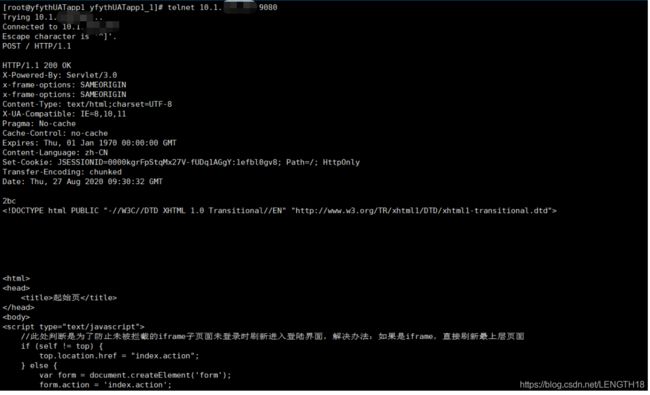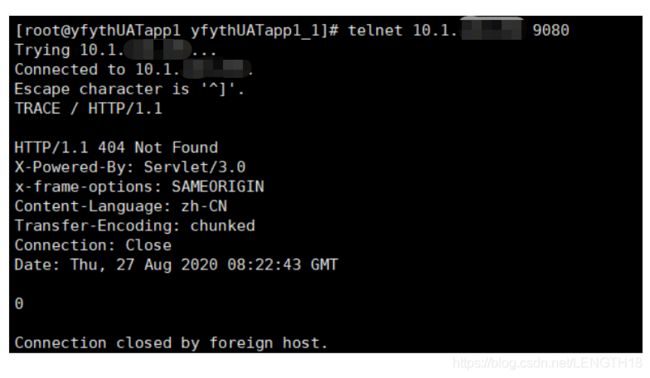WebSphere启用了TRACE,OPTIONS等不安全的HTTP方法漏洞修复
WebSphere启用了TRACE,OPTIONS等不安全的HTTP方法
因甲方要求项目必须基于was服务器运行,在基于was服务器的安全扫描时发现漏洞,由于对was服务器的不熟悉,并且相关was问题搜索结果甚少,导致修复5个漏洞耗时4天才得以修复,此帖子记录修复方式和踩过的坑。
安全扫描出的漏洞中其主要漏洞为未关闭http的不安全请求方式,基于现有系统只有get和post请求,下面方法除get和post方式请求其余全部拦截,主要方式通过拦截去获取当前请求方式,判断是否允许访问。
扫描出来漏洞为下面五个,其中测试人员已提供解决方案,但有些并不足以修复漏洞,详情请继续往下看
1.检测到目标服务器启用了TRACE方法(高危)
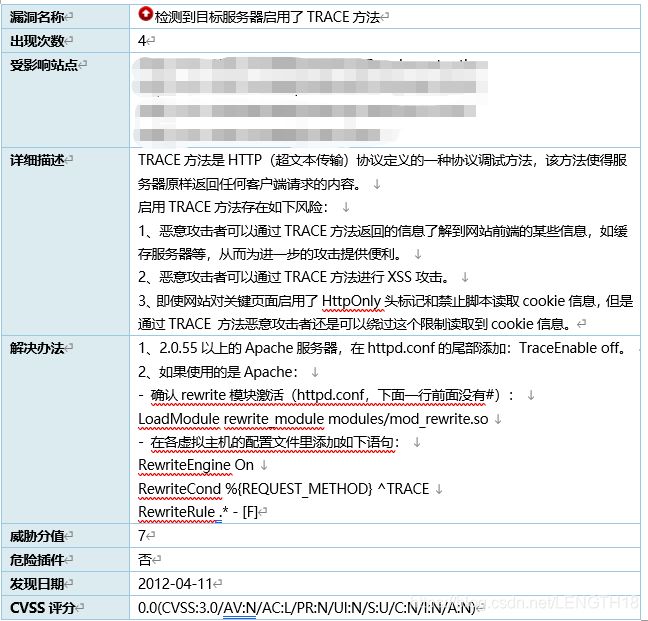
解决方式:
由于项目使用was服务器运行,本人使用截图中解决办法并未奏效,因was并不基于Apache运行,所以改了之后毫无用处,并且was中并未找到有类似的配置文件设置关闭方法,所以只能通过应用中代码设置拦截。
@Override
public void doFilter(ServletRequest req, ServletResponse res, FilterChain filterChain) throws IOException, ServletException {
HttpServletRequest request = (HttpServletRequest) req;
HttpServletResponse response = (HttpServletResponse) res;
//获取当前请求方式
String str=((HttpServletRequest) req).getMethod();
System.out.println("进入过滤器"+str);
//判断当前请求方式是否为我允许访问的方式
if (!str.equals(str.equals(HttpMethod.GET.toString()) && !str.equals(str.equals(HttpMethod.POST.toString())) {
System.out.println("当前请求方式是"+str+"进行拦截,返回404");
response.setStatus(404);
return;
}
filterChain.doFilter(request, response);
}
2.检测到目标服务器启用了OPTIONS方法(低危)
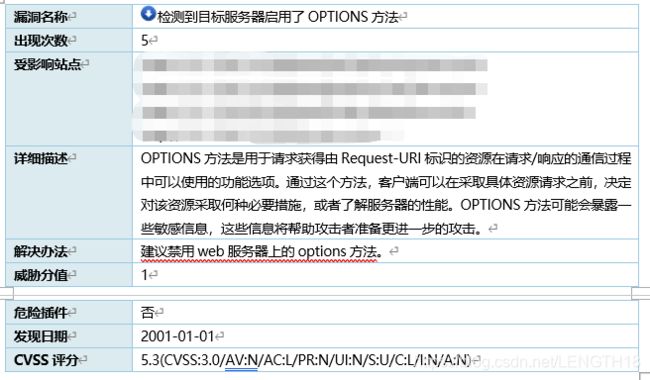
解决方式:
参考第1条漏洞
3.检测到目标URL存在http host头攻击漏洞(中危)
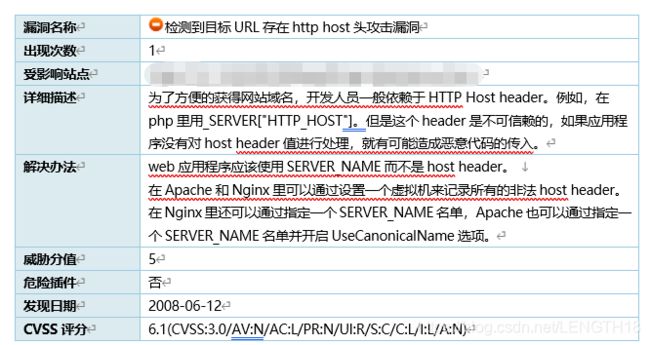
解决方式:
1.wes中自带请求头拦截功能,详情请见
https://wiki.smartbi.com.cn/pages/viewpage.action?pageId=47481406
2.通过拦截器方式配置白名单
@Override
public void doFilter(ServletRequest req, ServletResponse res, FilterChain filterChain) throws IOException, ServletException {
HttpServletRequest request = (HttpServletRequest) req;
HttpServletResponse response = (HttpServletResponse) res;
// 头攻击检测 过滤主机名
String requestHost = request.getHeader("host");
if (requestHost != null && !checkBlankList(requestHost)) {
response.setStatus(403);
return;
}
filterChain.doFilter(request, response);
}
//判断主机是否存在白名单中
private boolean checkBlankList(String host){
//todo 未来改域名需要同步修改
//添加允许访问的地址(项目运行地址,非本地请求地址)
if(host.contains("127.0.0.1")
|| host.contains("localhost")){
return true;
}
return false;
}
4.点击劫持:X-Frame-Options未配置(低危)

解决方式:
@Override
public void doFilter(ServletRequest req, ServletResponse res, FilterChain filterChain) throws IOException, ServletException {
HttpServletRequest request = (HttpServletRequest) req;
HttpServletResponse response = (HttpServletResponse) res;
//漏洞X-Frame-Options未配置
response.addHeader("x-frame-options","SAMEORIGIN");
filterChain.doFilter(request, response);
}
5.检测到目标URL启用了不安全的HTTP方法(低危)
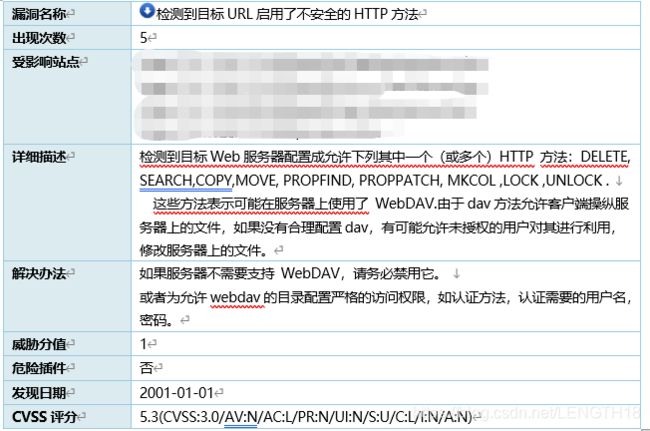
解决方式:
参考第1条漏洞
五个漏洞整合(项目中的代码)
项目中web.xml中添加如下代码:
<web-app version="2.5"
xmlns="http://java.sun.com/xml/ns/javaee"
xmlns:xsi="http://www.w3.org/2001/XMLSchema-instance"
xsi:schemaLocation="http://java.sun.com/xml/ns/javaee
http://java.sun.com/xml/ns/javaee/web-app_2_5.xsd">
<display-name>pms application</display-name>
<session-config>
<session-timeout>720</session-timeout>
</session-config>
<error-page>
<error-code>404</error-code>
<location>/error/404.html</location>
</error-page>
<error-page>
<error-code>500</error-code>
<location>/error/500.html</location>
</error-page>
<!--头攻击过滤-->
<filter>
<filter-name>HttpHostFilter</filter-name>
<filter-class>
cn.linkey.ws.server.HttpHostFilter
</filter-class>
</filter>
<filter-mapping>
<filter-name>HttpHostFilter</filter-name>
<url-pattern>/*
REQUEST
FORWARD
新建过滤器类代码为:
import javax.servlet.*;
import javax.servlet.http.HttpServlet;
import javax.servlet.http.HttpServletRequest;
import javax.servlet.http.HttpServletResponse;
import java.io.IOException;
@SuppressWarnings("serial")
public class HttpHostFilter extends HttpServlet implements Filter {
@Override
public void init(FilterConfig filterConfig) throws ServletException {
}
@Override
public void doFilter(ServletRequest req, ServletResponse res, FilterChain filterChain) throws IOException, ServletException {
HttpServletRequest request = (HttpServletRequest) req;
HttpServletResponse response = (HttpServletResponse) res;
//漏洞X-Frame-Options未配置
response.addHeader("x-frame-options","SAMEORIGIN");
String str=((HttpServletRequest) req).getMethod();
//判断当前请求方式是否为我允许访问的方式
if (!str.equals(str.equals(HttpMethod.GET.toString()) && !str.equals(str.equals(HttpMethod.POST.toString())) { System.out.println("当前方式是"+str+"进行拦截,返回404");
response.setStatus(404);
return;
}
// 头攻击检测 过滤主机名
String requestHost = request.getHeader("host");
if (requestHost != null && !checkBlankList(requestHost)) {
response.setStatus(403);
return;
}
filterChain.doFilter(request, response);
}
//判断主机是否存在白名单中
private boolean checkBlankList(String host){
//todo 未来改域名需要同步修改
//添加允许访问的地址(项目运行地址,非本地请求地址)
if(host.contains("127.0.0.1")
|| host.contains("localhost")
){
return true;
}
return false;
}
}
扩展
1、http的请求方式有

2.修复第一个漏洞如是apache服务器可执行如下操作,亲测本地可行:
linux具体操作如下: 找到服务器配置文件
/etc/httpd/conf/httpd.conf
在文件最后一行加上 TraceEnable off
如果不行的话在 vhost.conf 也加上以上的指令,重启apache
/etc/init.d/httpd restart
或是在httpd.conf里面每一个visual host里面加以下的module(RrwriteEngine需要compiler)
RewriteEngine on RewriteCond %{REQUEST_METHOD}^(TRACE|TRACK) RewriteRule .* – [F]
这一点比较复杂visual host都加上…重启
/etc/init.d/httpd restart 稍后生效
3.拦截http请求,修复第一、二、五漏洞,在web.xml中配置如下代码:
此方法本地测试和tomcat测试可行,was服务器中不生效,如用was建议使用拦截器方式解决。
此代码配置在应用中表示当前应用有效,配置在tomcat的web.xml中表示在tomcat下运行的项目都有效
<web-app version="2.5"
xmlns="http://java.sun.com/xml/ns/javaee"
xmlns:xsi="http://www.w3.org/2001/XMLSchema-instance"
xsi:schemaLocation="http://java.sun.com/xml/ns/javaee
http://java.sun.com/xml/ns/javaee/web-app_2_5.xsd">
<!-- 关闭不安全的HTTP方法 -->
<security-constraint>
<web-resource-collection>
<web-resource-name>test</web-resource-name>
<url-pattern>/*
PUT
DELETE
HEAD
OPTIONS
TRACE
BASIC
4.测试关闭http请求方式是否生效
telnet ip 端口
回车
TRACE / HTTP/1.1
两次回车会看到响应消息,如果不行多点几次或者根据情况查看原因
其他凡是请求可将头部换掉如
POST / HTTP/1.1
GET / HTTP/1.1
功能开启显示为
